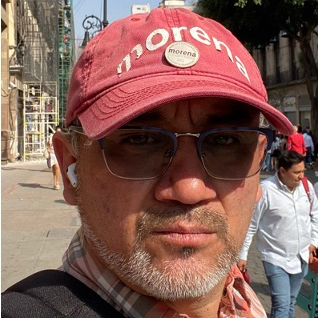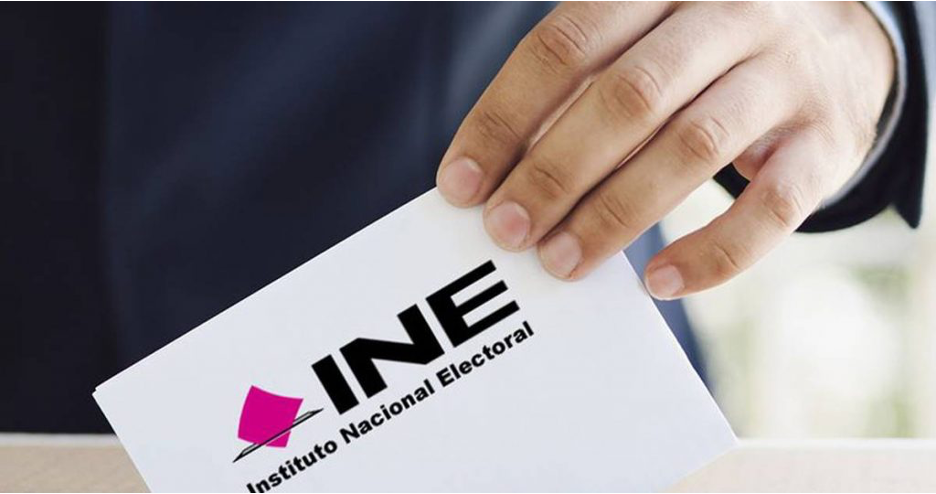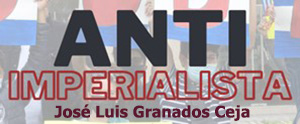|
|
|
|
The weekly newsletter of the Mexico Solidarity Project |
|
Every issue archived online at mexicosolidarityproject.org |
|
|
|
April 17, 2024/ Meizhu Lui, for the editorial team |
|
|
|
Running Election Campaigns: Rules Vary |
|
|
OtherWords cartoon by Khalil Bendib |
|
Holding elections alone doesn’t make a country democratic, but a democratic country does require elections — the people must be able to choose their leaders. But how elections are run makes a difference. In both Mexico and the US, many working people have suspected that the vote is rigged — and often they’re right! Not to mention that rather than getting to choose a candidate they really want, the real choice is too often between “none of the above” and “lesser of evils.”
In the US, money in politics is a big problem — because “money talks.” In 2010, that common saying got elevated to law by the Supreme Court, which ruled that money is speech protected by the Constitution’s guarantee of freedom of speech. Wealthy donors continue to say what they want, but they also pour all the millions of dollars they want into friendly politicians’ campaign coffers. Now, money doesn’t just talk — it deafens the opposition.
In Mexico? Diego Torres helps us understand how Mexico’s elections differ from the US, particularly in campaign financing. By law, the Mexican government funds most of campaign costs and caps how much a party raises from private donors — a rule US voters can only dream about!
But Mexico also needs electoral reform. We talked with Diego right after the first presidential debate. He explains that their campaign financing problem is that the government funding for parties and campaigns is too generous — that some of those dollars could go into expanding social programs for the people.
But democracy is not a static entity. It’s the engagement of the people: a million of us can still shout down a million dollars. And Mexican voters know how to shout. |
|
For a deeper dive into current news and analysis in English, check out our media website. And definitely see the new English podcast ¡Soberanía! (Sovereignty) with José Luis Granados Ceja and Kurt Hackbarth. They entertain, while dismantling the lies and distortions about Mexico fed to us by the mainstream media. |
|
Don’t miss an issue! Sign up for a free Mexico Solidarity Bulletin subscription. |
|
ERRATA: In the April 3 issue on Gender in Transition, we misquoted Edwing Roldán with this phrase: "the Supreme Court recently recognized femicide and trans femicides as specific kinds of crimes." What he actually said was that "Transfemicide is not recognized as a specific type of crime, but the Supreme Court was clear that the crime of femicide also applies to trans women. |
|
|
Mexico’s 3-Month Presidential Campaign |
|
|
Mexico City native Diego Alfredo Torres Rosete lived in the US as an undocumented immigrant for 20 years. After returning to Mexico, he worked in the AMLO government’s Secretariat of Mexicans Abroad and International Affairs. He’s now the Coordinator of the Frente Amplio de Mexicanos en el Exterior (Broad Front of Mexicans Abroad), which defends and serves the needs of all migrants. He’s also an independent journalist and a Morena activist. |
|
Mexico only allows presidential candidates to campaign for three months?!
That’s right. The campaign is conducted in three time periods. In the first, each political party selects its candidates. The second is a one-month period to investigate the people’s main concerns. In the last one — from March first to the June election — they tell the public, “I heard what you want, and I now have developed a program.” Only in these last three months can they go out and ask people for their votes.
Three candidates are running for president: Claudia Sheinbaum from Morena, Xóchitl Gálvez from the conservative PRI/PAN/PRD coalition, and Jorge Álvarez Máynez from the Movimiento Ciudadano party.
Parties are largely publicly financed. Does that make elections fairer? And what about media time? |
|
The National Electoral Institute (INE) allocates public money to the parties for regular party business. The amount is proportional to the number of elected positions won in the last election. That, of course, favors the ruling party. The old PRI government invented the formula; they never expected an opposition party like Morena to benefit from that rule! The INE then allocates even more money specifically for electoral campaigns, not just for the president but also for governors, senators, representatives, and others. |
|
|
INE organized in-person voting for 2023 in Canada and the US |
|
AMLO thought that spending so much government money was a waste, and he proposed to cut it, even though Morena would have been the loser. This kind of cut is what he means by “republican austerity.” But his proposal did not pass in Congress.
By law, the media must give equal time to the parties for 30% of the time; the other 70% is apportioned the same way as the funding. Of course, since the main media outlets are conservative, even though they must cover everyone, how they present them can still be slanted.
What’s the process for the national debates? |
|
|
Foto:Especial/Poresto/INE publishes dates for debates |
|
The INE decides the number of debates, and their process. They scheduled three debates for the coming June election. Each party can send a proposal as to who they want as moderators, but the INE makes the final choice. For this first debate on April 7, the INE selected Denise Maerker and Manuel López San Martín from two giant TV stations, Televisa and Tele Azteca, owned by wealthy conservatives. |
|
Citizens submitted 24,000 questions for the debate through social media. The INE hired a company to group them by category and to whittle them down to 108. The topics were health and education, corruption and transparency, violence against women and discrimination. The moderators chose the final 30 questions.
To ensure a variety of voices, they picked the questions from each of the three main regions of the country: the wealthier North, the more educated middle-class Central region, and the poorer South. But since many people aren’t comfortable with using social media, it’s not surprising that the questions from each region were pretty much the same, reflecting class and not region. For the second debate, questions will be collected on the streets, so we’ll see more regional differences.
In this debate, each candidate had one minute to put out a general statement in response to the main question, then another five minutes for more details and to respond to each other. They debated in three rounds, one for each topic, and then each had one minute for a final pitch.
With this format and so little time to answer, all they could do was give sound bites. For example, one question was about femicides, but Claudia didn’t have time to explain the programs for women she put in place while mayor of Mexico City. Debate? Hardly. Because rather than presenting policy proposals, Xóchitl attacked Claudia personally, using her time on the clock to call her “cold and heartless, the ice lady.” That kind of talk wasn’t worth a response.
Could the public get a sense of their different visions for Mexico’s future?
AMLO’s reforms have been so popular that it would have been suicidal for Gálvez or Máynez to disagree with them publicly. So, both Máynez and Gálvez said they would do the same things — only better! Both supported the universal scholarship programs for children and youth and the payments for the elderly put in place by AMLO.
In the case of Gálvez, it’s on record that she opposed those same programs in Congress! So, now people see she’s a liar; you can’t trust what she says. Besides, how did she say she would improve the programs? By issuing a government-funded debit card to use not only at public health care facilities and schools but also at private institutions! A big boost for the profits of private enterprises, and a return to neoliberalism’s agenda of privatization.
So, who won? |
|
|
photo: kk5hy, Storyblocks |
|
After the debate, the polls showed no big changes; the results were predictable, with Claudia remaining about 20 points ahead of Gálvez.
I’d say the MC’s Máynez was the winner. He gained a few percentage points, from about 6% to 8% favorability. Because he knows that Claudia’s lead is solid, he was more interested in moving some votes from Xóchitl into his column — and maybe helping his party members gain seats in the down-ballot races. |
|
The other winner? The Mexican public. In the past, Mexicans mainly just tuned in to soccer and soaps. Now, they are also watching the political debates. The Media Research Center reports that more than 11.8 million people watched the debate. YouTube had 823,000 Spanish language viewers, 9,800 Mayan, 15,000 Nahuatl, 34,700 in Tsotsil, and 164,3010 in Mexican Sign Language.
AMLO is right that the consciousness of the nation has changed (his mañaneras did a lot to educate the public). Ordinary people understand more about the choices they have and what a difference those choices can make in their daily lives. The kids watching the debate with their parents (Mexican families often watch TV together) will grow up able to rate candidates beyond how good-looking or entertaining they are.
People will watch the second and third debates too. And this interest in politics is good for our country. |
|
|
|
|
Lawfare: ‘Justice System’ vs Democracy |
|
|
Mexico City based freelance writer and photojournalist José Luis Granados Ceja previously spent time as a staff writer for teleSUR, and currently works with Venezuelanalysis. His writing on contemporary Latin American democratic struggles can be followed on X (Twitter): @GranadosCeja. |
|
|
On Friday, April 5, 2024, in gross violation of international law, Ecuadorian police raided the Mexican Embassy in Quito and kidnapped the former vice president of Ecuador, Jorge Glas. This unprecedented incident culminated a year-long effort to marginalize the largest political force in Ecuador by using lawfare tactics.
Following his election in 2017 to the presidency on a progressive ticket, Lenín Moreno turned against his former comrades; he engaged in a systematic campaign of state repression by employing the justice system to persecute supporters of former leftist president Rafael Correa. Correa himself lives under political asylum in Belgium. Current right-wing Ecuadorian President Daniel Noboa’s flagrant disregard for the Vienna Convention is an attempt to boost his declining popular support.
In Mexico, conservative forces are also engaging in lawfare, carrying out a scheme that could amount to the most serious assault on the country’s democracy since the 2006 fraud.
In an effort to interfere in Mexico’s electoral process, Supreme Court President Norma Piña has personally authorized a corruption probe into her predecessor, Arturo Zaldívar, based solely on an anonymous complaint submitted without any supporting evidence. Zaldívar, who presided over a court that cooperated with Andrés Manuel López Obrador’s government to expand social rights, stepped down as a sitting justice last year to become an advisor to presidential candidate Claudia Sheinbaum.
Zaldívar was quick to condemn Piña’s decision to open a probe, saying that it runs roughshod over standard practices at the country’s highest court, calling it a "witch hunt" done with "clear political intent" to interfere with the coming election. “Norma Piña's intent is political, not legal. She has placed her bets on the [opposition] candidate, she is very close to their entire group. We see how she has operated clearly in favor of the right, and any remaining doubt is now removed," said Zaldívar.
The affair’s timing has also raised eyebrows, coming days after opposition candidate Xóchitl Gálvez’s disastrous performance in the first presidential debate; she failed to inject much-needed energy into her floundering campaign.
Sheinbaum tapped Zaldívar to craft her proposal to reform the country’s judicial system. Mexico’s thoroughly rotten judicial system has become a key instrument of the ancien régime to protect its power and privilege and impede Morena’s agenda. Zaldívar personifies Morena’s effort to go after the conservatives taking shelter inside the country’s justice system. The smear campaign against Zaldívar attempts to undercut efforts to carry out a badly needed reform. From Ecuador to Brazil to Mexico and throughout Latin America, the bourgeoisie, when faced with declining hegemony, has turned to lawfare tactics to stop the people’s mandate for a more just distribution of wealth. Noboa’s actions in Mexico’s Embassy in Quito show how far the right is willing to go if left unchecked.
The Mexican judicial branch’s effort to influence the election for the executive and legislative branches is an assault on Mexico's democracy itself and must be rejected outright. |
|
|
|
|
Recent news reports and commentaries, from progressive and mainstream media, |
|
How much of Mexico City’s water supply is extracted by private companies? Mexico News Daily. Numerous Mexico City-based companies have concessions that allow them to extract hundreds of millions if not billions of liters of water per year, including Grupo Modelo, Coca Cola, Procter & Gamble, Colgate-Palmolive, & Televisa.
Denuncian mexicanos en el extranjero que el INE les he cancelado su derecho a votar Fábrica de Periodismo. Han recibido un correo en que les dicen que se les canceló su inclusión en el listado de electores. "Es un atropello a nuestros derechos democráticos", reclaman.
Branko Marcetic, Does the Biden Administration Care About International Law? Jacobin. If you’re a US ally looking at Israel’s bombing of the Iranian consulate in Syria and Ecuador’s raid on its Mexican consulate, you’re probably thinking, “I can get away with something similar because the most powerful country in the world will let me do it.”
AMLO agradece que Canadá haya rectificado su postura tras invasión a la Embajada de México en Ecuador Los Reporteros MX. AMLO agradece que Canadá haya corregido sus postura tras la invasión a la Embajada de México en Ecuador; “fue una clara violación de la Convención de Viena”, declaró el país norteamericano.
Arturo Cano, Meet Claudia Sheinbaum, Who May Be Mexico’s First Woman President The Nation. The former student activist and current mayor of Mexico City is poised to make history with an ambitious platform on education, clean energy, and combatting violence against women.
Zedryk Raziel, Gálvez critica a Sheinbaum por vivir en un departamento alquilado: “Si a los 60 años no has podido hacer un patrimonio, eres bien güey” El País. La candidata opositora desata la indignación en redes y abre el debate sobre los problemas de la población para acceder a una casa propia.
Michael O’Boyle, Mexico’s Billionaires Piled Up Riches as AMLO Raged Against Them Bloomberg. Even though Mexico’s richest strata continued to get richer during AMLO’s presidency, simply enforcing Mexico’s extremely low tax rates was enough for some of them to lash out in fury at AMLO and his supporters.
César Huerta, Los contratos millonarios que el INAI le dio a Xóchitl Gálvez Polemon. En uno de sus intentos por escabullirse, la candidata presidencial del PRI-PAN-PRD, Xóchitl Gálvez, llegó al extremo de negar una de sus empresas que tanto presumió en el pasado.
Indigenous rights protected in United States-Mexico-Canada Trade Agreement IATP. Mexico’s ban on the use of genetically engineered corn upholds Indigenous rights and is legal under USMCA.
Julio Hernández López, Astillero La Jornada. La conducta fascistoide del presidente de Ecuador no ha sido solamente un exabrupto personal, pues embona con la pretensión impulsada desde Estados Unidos e Israel de abatir los principios avanzados del derecho internacional y abrir paso a acciones violentas como las realizadas en Gaza y otros países de la región. Además, encaja en el libreto detonado con las acusaciones, sincronizadas y sin pruebas, en tres medios extranjeros contra AMLO tachándolo de recibir financiamiento electoral en anteriores comicios. |
|
|
|
|
The Mexico Solidarity Project brings together activists from various socialist and left organizations and individuals committed to worker and global justice. We see the 2018 election of Andrés Manuel López Obrador as president of Mexico as a watershed moment. AMLO and his progressive Morena party aim to end generations of corruption, impoverishment, and subservience to US interests. Our Project supports not just Morena, but all Mexicans struggling for basic rights, and opposes US efforts to undermine organizing and Mexico’s national sovereignty.
Editorial committee: Meizhu Lui, Bruce Hobson, Agatha Hinman, Victoria Hamlin, Courtney Childs, Susan Weiss. To give feedback or get involved yourself, please email us! |
|
Subscribe! Get the Mexico Solidarity Bulletin in your email box every week. |
|
Web page and application support for the Mexico Solidarity Project from NOVA Web Development, a democratically run, worker-owned and operated cooperative focused on developing free software tools for progressive organizations. |











